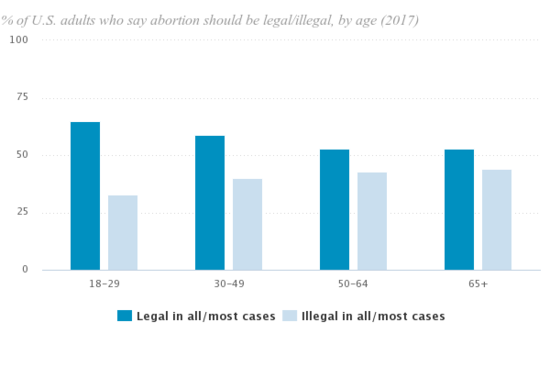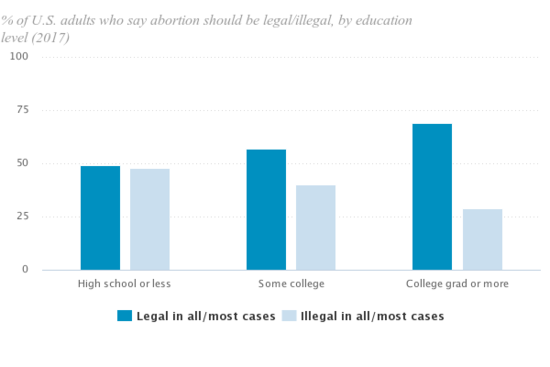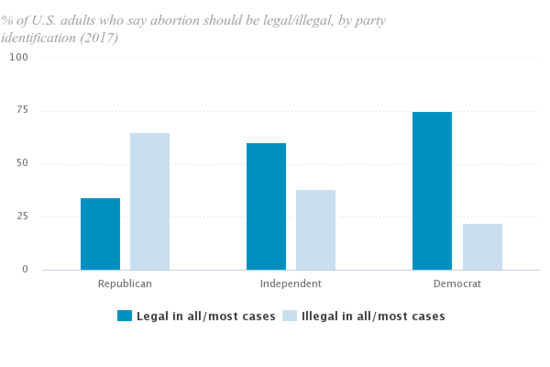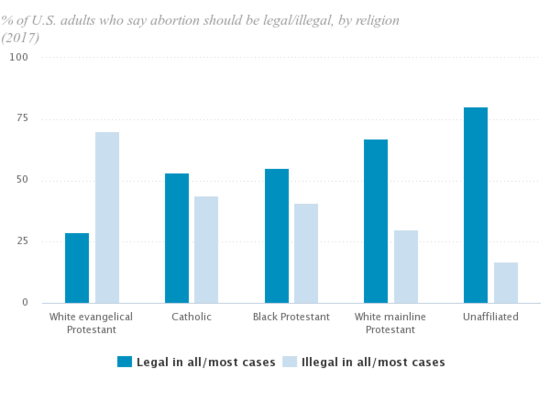Fact check: Public opinion on abortion
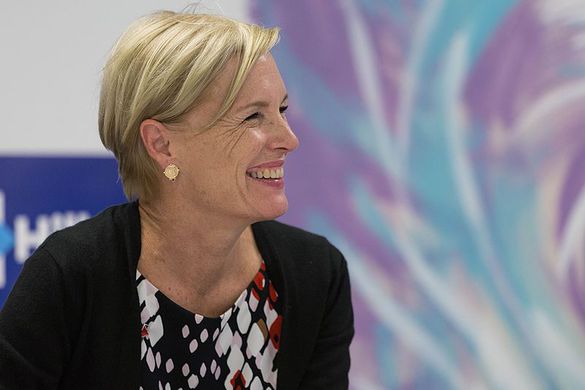
Cecile Richards, president of Planned Parenthood
October 5, 2017
By Amée LaTour
Ben Ray Luján, the chair of the Democratic Congressional Campaign Committee (DCCC), said in August that candidates' positions on abortion would not be a deciding factor for the committee’s support in the 2018 House elections. Criticizing that stance, Planned Parenthood President Cecile Richards claimed in an interview with Politico's "Off Message," "It’s a shocking sort of misunderstanding of actually where the country is at, which is overwhelmingly supportive of abortion rights."[1]
Are Americans "overwhelmingly supportive of abortion rights"?
There is wide variation in the results of surveys about abortion based on the nature of the question posed, particularly when polling about the timing and other circumstances of the procedure.[2][3][4] Public opinion about abortion also varies widely by religious and political affiliation, education level, and age.[5][6]
Background
Cecile Richards is president of Planned Parenthood Federation of America, a nonprofit organization that, according to its website, "delivers vital reproductive health care, sex education, and information to millions of women, men, and young people worldwide."[7] In fiscal year 2016, the organization received 41 percent of its revenue, totaling $554.6 million, primarily from Medicaid reimbursements.[8]
The Democratic Congressional Campaign Committee (DCCC) supports the campaigns of Democratic candidates for the House of Representatives. Rep. Ben Ray Luján (D-N.M.) serves as the chair of the DCCC. He was first elected to the House in 2008.
In an interview with The Hill regarding the DCCC's willingness to financially support 2018 Democratic House candidates who oppose abortion, Luján said, "There is not a litmus test for Democratic candidates. As we look at candidates across the country, you need to make sure you have candidates that fit the district, that can win in these districts across America.”[9]
Abortion laws
In the 1973 Supreme Court case Roe v. Wade, the court ruled that states can only restrict abortion before the point of fetal viability to preserve a woman's health.[10] After the point of viability, "the State, in promoting its interest in the potentiality of human life, may, if it chooses, regulate, and even proscribe, abortion except where necessary, in appropriate medical judgment, for the preservation of the life or health of the mother."[11]
The Guttmacher Institute, which describes its mission as "advanc[ing] sexual and reproductive health and rights in the United States and globally," reports that 43 states limit abortion by gestational maturity, and 19 states prohibit abortions beyond 20 weeks of pregnancy unless the woman's health is in danger (among other regulations).[12][13]
The U.S. House on October 3 approved a ban on abortions after 20 weeks of pregnancy by a vote of 237 (including three Democrats) to 189 (including two Republicans).[14]
Public opinion on abortion
Several polling outlets have asked survey participants about their opinions on abortion over the years, posing an array of questions and offering a variety of response options. Responses vary depending on the subject of the question and its wording and on the respondent’s education level, age, political affiliation, religious affiliation, race, and sex.
Each year since 2007, the Pew Research Center has asked U.S. adults, "Do you think abortion should be legal in all cases, legal in most cases, illegal in most cases, or illegal in all cases?"[4][15][16]
Pew analyzed the 2017 responses by age, education level, party identification, and religious affiliation. Use the tabs in the chart below to view responses by group.[5]
Age
Education
Party ID
Religion
Every year since 1994, Gallup has asked U.S. adults: "Do you think abortions should be legal under any circumstances, legal only under certain circumstances or illegal in all circumstances?" Responses are plotted in the following chart.[2][17]
Every year since 1977, the National Opinion Research Center (NORC) has asked survey participants if they believe a woman should be able to obtain a legal abortion in seven specific situations and found that responses vary based on the following reasons:[3]
a. If there is a strong chance of serious defect in the baby;
b. If the woman is married and does not want any more children;
c. If the woman’s own health is seriously endangered by the pregnancy;
d. If the family has a very low income and cannot afford any more children;
e. If the woman became pregnant as a result of rape;
f. If the woman is not married and does not want to marry the man;
g. The woman wants it for any reason
In February 2017, Quinnipiac University asked registered voters, "In general, do you agree or disagree with the 1973 Roe v. Wade Supreme Court decision that established a woman's right to an abortion?" Responses varied among cohorts as shown below.[6]
| Percent who agree with Roe v. Wade decision | |||||||||||||
|---|---|---|---|---|---|---|---|---|---|---|---|---|---|
| Total | Political affiliation | Sex | Whites with | Age | Race | ||||||||
| Rep | Dem | Ind | Men | Women | College degree | No degree | 18-34 | 35-49 | 50-64 | 65+ | White | Nonwhite | |
| 67% | 36% | 92% | 71% | 61% | 72% | 72% | 56% | 72% | 68% | 72% | 58% | 63% | 78% |
Planned Parenthood responded six weeks following Ballotpedia's initial request for evidence and cited polls that also show variations in opinions based on the wording of questions and respondents' characteristics.[18]
Conclusion
DCCC Chair Ben Ray Luján said in August that Democratic candidates' positions on abortion would not be a litmus test for the DCCC's support in the 2018 House elections. Criticizing that stance, Planned Parenthood President Cecile Richards claimed in an interview with Politico's "Off Message," "It’s a shocking sort of misunderstanding of actually where the country is at, which is overwhelmingly supportive of abortion rights."[1]
There is wide variation in the results of surveys about abortion based on the nature of the question posed, particularly when polling about the timing and other circumstances of the procedure.[2][3][4] Public opinion about abortion also varies widely by religious and political affiliation, education level, and age.[5][6]
See also
- Federal policy on abortion, 2017-2020
- Planned Parenthood Federation of America
- Fact check/Does the AHCA make being a woman a pre-existing condition?
Sources and Notes
- ↑ 1.0 1.1 Politico Magazine, "Cecile Richards to Democrats: Stand Firm on Abortion," August 15, 2017
- ↑ 2.0 2.1 2.2 Gallup, "Abortion," accessed August 29, 2017
- ↑ 3.0 3.1 3.2 National Opinion Research Center, "GSS Data Explorer, variable abany," accessed September 24, 2017
- ↑ 4.0 4.1 4.2 Pew Research Center, "Summer 2017 Political Landscape Survey, Final Topline," June 2017
- ↑ 5.0 5.1 5.2 Pew Research Center, "Public Opinion on Abortion," July 7, 2017
- ↑ 6.0 6.1 6.2 Quinnipiac University, "Most American Voters Disagree With Trump On Key Issues, Quinnipiac University National Poll Finds; Keep Climate Protections, Obamacare, But No Wall," February 8, 2017
- ↑ Planned Parenthood, "Who We Are," accessed Auggust 31, 2017
- ↑ Planned Parenthood, "2015-2016 Annual Report," accessed September 27, 2017
- ↑ The Hill, "Dem campaign chief vows no litmus test on abortion," July 31, 2017
- ↑ Fetal viability is the point at which a fetus could survive outside the womb with assistance, which the court estimated at between 24 and 28 weeks.
- ↑ Supreme Court of the United States, Roe v. Wade, January 22, 1973
- ↑ One state with a 20-week ban, Arkansas, also provides an exception if the pregnancy was caused by rape or incest.
- ↑ Guttmacher Institute, "An Overview of Abortion Laws," updated August 1, 2017
- ↑ Office of the Clerk, U.S. House of Representatives, "Final Vote Results for Roll Call 549," October 3, 2017
- ↑ For years in which Pew asked the same question in multiple polls, Ballotpedia used results from the most recent poll.
- ↑ Response options were read in reverse for half the sample.
- ↑ For years in which Gallup asked the same question in multiple polls, Ballotpedia used results from the most recent poll.
- ↑ Planned Parenthood Action Fund, "Public Overwhelmingly Supports Planned Parenthood," updated March 2017
Launched in October 2015 and active through October 2018, Fact Check by Ballotpedia examined claims made by elected officials, political appointees, and political candidates at the federal, state, and local levels. We evaluated claims made by politicians of all backgrounds and affiliations, subjecting them to the same objective and neutral examination process. As of 2026, Ballotpedia staff periodically review these articles to revaluate and reaffirm our conclusions. Please email us with questions, comments, or concerns about these articles. To learn more about fact-checking, click here.
Contact
More Fact Checks
|
|
|
|



